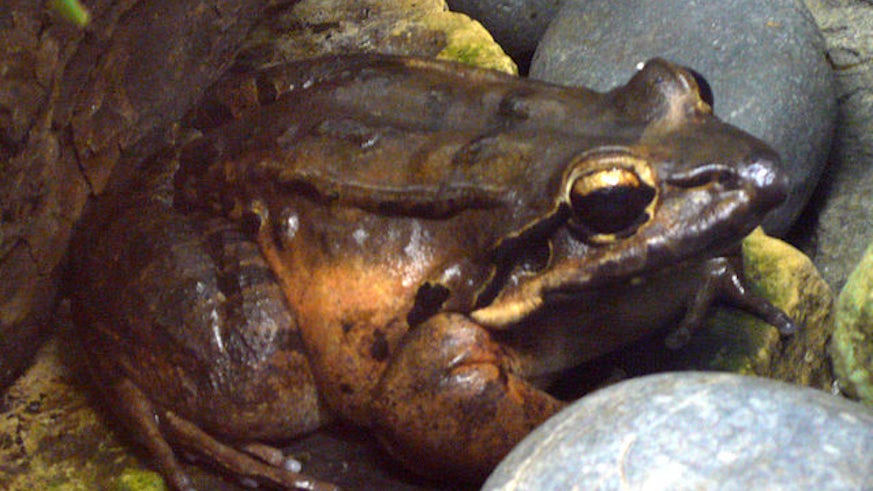Lessons for conservation
11 August 2016

Scientists battling to fight a lethal amphibian disease on two Caribbean islands have witnessed what is believed to be one of the fastest species-wide declines ever recorded for any animal – pushing a critically endangered frog species towards the verge of extinction.
Chytridiomycosis (chytrid) is already responsible for devastating hundreds of amphibian species worldwide. Now, a team of conservation scientists, including researchers from the University’s School of Biosciences, has gathered evidence showing that over a period of just 18 months the disease killed more than 85 per cent of mountain chicken frogs (Leptodactylus fallax) on the island of Dominica. Neighbouring Montserrat fared even worse, with its mountain chicken population being rendered virtually extinct in the same amount of time.
Mountain Chicken Recovery Programme partners the Zoological Society of London (ZSL), Durrell Wildlife Conservation Trust, Chester Zoo and the governments of Dominica and Montserrat worked alongside Cardiff University and the University of Kent to track mountain chicken populations on both islands before, during and after the emergence of chytrid. The data they collected enabled researchers to build up a real-time picture of the disease’s devastating impact on this species and to track how this dramatic crash in population size has caused a substantial reduction in the genetic diversity of the remaining mountain chicken frog population on Dominica. The data also raise important questions about the effectiveness of existing attempts to contain the pandemic.
ZSL, Durrell and Chester Zoo have been working with the governments of the two islands to prevent the species from becoming extinct. Captive breeding is a key component of this recovery programme, and it is essential that the frogs used for breeding are a good representation of the genetic diversity of the species in the wild. As part of this project, a Cardiff University research team lead by Professor Mike Bruford and Dr Pablo Orozco-terWengel studied the genetic diversity of wild mountain chicken frogs in Dominica and Montserrat, and of the captive population used for the recovery programme.
Josie D’Urban Jackson, a PhD student at Cardiff University School of Biosciences who undertook the genetic analysis explains the study’s results: “The catastrophic population crash caused by the deadly fungal disease, chytrid, has considerably reduced the genetic diversity of mountain chicken frogs in Montserrat and Dominica.
“However, one positive finding from the study is that the genetic diversity in the captive population is representative of the wild population, providing further support to the captive breeding of this species to save it from extinction.”
Lead author of the study, Michael Hudson - based across ZSL’s Institute of Zoology (IoZ), Durrell and the University of Kent – said: “These findings from Dominica and Montserrat provide perhaps the starkest evidence to date of the terrifying rate at which chytrid is destroying the genetic diversity of amphibian populations worldwide and driving many species towards extinction.”
Findings from this paper question the ability of countries to reach biodiversity conservation targets set by the United Nations Convention of Biological Diversity. The paper also highlights the importance of incorporating genetic analysis into conservation programmes of highly threatened species in order to inform captive breeding management and better understand the impact of population declines.
The research ‘Dynamics and genetics of a disease-driven species decline to near extinction: lessons for conservation’ is published in Scientific Reports.
